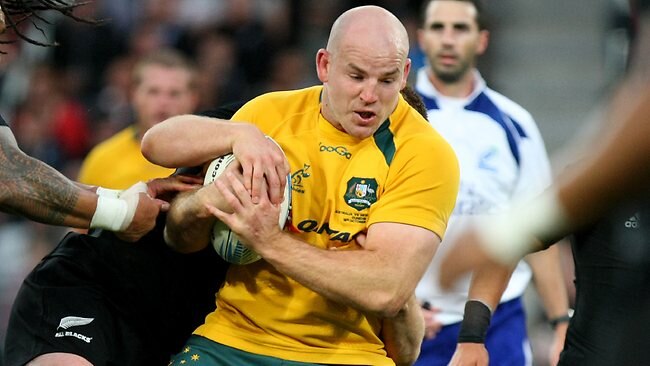Stephen Moore regrets Wallabies' culture slide under Robbie Deans but says it's turning around
Wallabies elder statesman Stephen Moore admits senior players should have stepped in when the Wallabies' culture began to slide under previous coach Robbie Deans.
Moore has revealed his regret at not pulling up wayward teammates like James O’Connor and Kurtley Beale, whose off-field incidents divided the dressing room and proved the final straw in Deans’s tenure.
In a forthright and candid interview with Australian reporters in London, where the Wallabies are preparing to play England this weekend, Moore said the Wallabies’ culture has improved dramatically under coach Ewen McKenzie and lauded the once-problematic Quade Cooper as a shining example of the turnaround.
One of the most respected voices in the team, Moore also said O’Connor must realise "the privilege of playing for Australia" if he hopes to return to the side.
The Wallabies’ culture sunk to concerning depths during the British & Irish Lions series when O’Connor and Beale were involved in late-night antics, missed buses to training and skipped meetings while Deans - under pressure to win - continued to select them.
Australia lost and Deans was sacked.
"I feel bad about how it went, that’s for sure, I’m not happy about the off-field incidents that happened," Moore said.
"Probably as senior players we could have done better, that’s for sure.
Moore says the senior players should have stepped in when the culture was deteriorating.
"That’s something I will probably look back and regret, that we didn’t act on some of that stuff when we probably should have.
"But I think there were probably times when Robbie put a lot of faith in young guys and maybe they let him down.
"Whenever we had an off-field incident it wasn’t just the new guys, it was other guys as well.
"It’s up to us as players to reward that faith, we are playing for our country and it’s very important."
Moore believes the culture of a team must be set by its coach.
"The coach obviously operates at the top of that tree, that would be where I see it being really important," he said.
"Then it’s up to the senior players to really drive it.
"It’s different in every team but the coach sets the tone, the senior players, it’s up to them to live it and drive it and make sure the guys coming into the group are aware of what is expected and aware of the sacrifices, the dedication, and the discipline required."
Asked how the culture is within the team now, Moore replied: "I think it’s really good, it has been excellent.
"Quade is a good example of that, he has been really impressive over the last six months in how he’s carried himself around the team, and how professional he’s been and how much time he has put into his preparation.
"I think you see that out on the field.
"The guys are really tight, we’ve got a really great bunch of guys. We’re really keen to now show that on the field by being consistent.
"Ewen certainly brought the best out of [Cooper], he’s obviously got a lot of respect for Ewen and what he’s done with him at the Reds.


